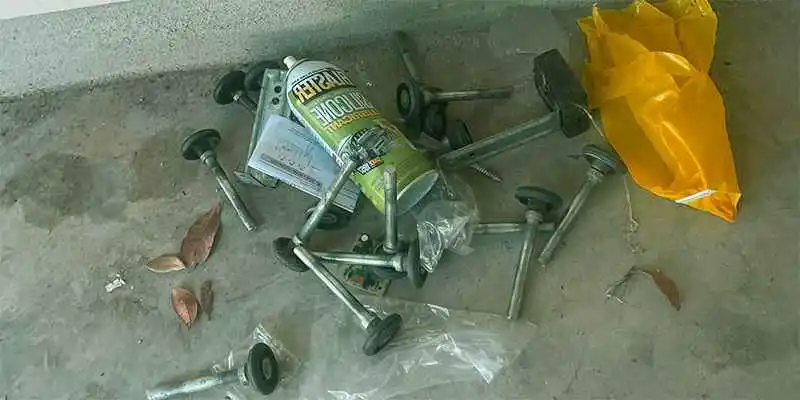Garage door wheels play a crucial role in the smooth operation of your garage door. Ensuring they are in good condition can save you from unexpected issues and expensive repairs. In this article, we will explore the importance of garage door wheels, maintenance tips, signs of wear, and the replacement process. By the end, you’ll have a thorough understanding of how to keep your garage door wheels in top shape.
Garage door wheels, also known as rollers, are vital components that enable the door to move smoothly along the tracks. These small but significant parts carry the weight of the door, allowing it to open and close with ease. Without properly functioning wheels, your garage door can become noisy, difficult to operate, or even get stuck.
Types of Garage Door Wheels
There are several types of garage door wheels available, each with its own set of benefits. The most common types include:
- Steel Wheels: Known for their durability and strength, steel wheels are often used in heavy-duty garage doors. They require regular lubrication to prevent rust and ensure smooth operation.
- Nylon Wheels: These wheels are quieter than steel wheels and require less maintenance. They are ideal for residential garage doors due to their smooth and silent operation.
- Plastic Wheels: Although less durable than steel and nylon, plastic wheels are cost-effective and suitable for lightweight garage doors.
Signs Your Garage Door Wheels Need Attention
Regular inspection of your garage door wheels can help you identify potential issues before they escalate. Here are some signs that indicate your garage door wheels need attention:
- Noise: If your garage door makes loud or unusual noises during operation, it could be a sign that the wheels are worn out or need lubrication.
- Difficulty in Operation: If the door is hard to open or close, the wheels might be damaged or misaligned.
- Visible Wear and Tear: Inspect the wheels for any cracks, chips, or signs of excessive wear. Damaged wheels should be replaced immediately to avoid further complications.
How to Maintain Garage Door Wheels
Proper maintenance can extend the life of your garage door wheels and ensure smooth operation. Here are some maintenance tips:
- Lubrication: Regularly lubricate the wheels and tracks with a silicone-based lubricant. This reduces friction and prevents rust.
- Cleaning: Keep the tracks clean and free from debris. Dirt and grime can cause the wheels to wear out faster and affect the door’s operation.
- Regular Inspections: Perform routine inspections to check for any signs of wear or damage. Early detection can prevent costly repairs.
Common Problems with Garage Door Wheels
Despite regular maintenance, you may encounter some common issues with garage door wheels. Here are a few problems and their solutions:
- Worn Out Wheels: Replace worn-out wheels immediately to avoid further damage to the door and tracks.
- Misaligned Tracks: Ensure the tracks are properly aligned to prevent the wheels from derailing.
- Lack of Lubrication: Regularly lubricate the wheels to reduce friction and prevent wear.
Frequently Asked Questions
Q: How often should I replace garage door wheels?
A: Typically, garage door wheels should be replaced every five to seven years. However, if you notice signs of wear or damage, replace them sooner.
Q: Can I replace garage door wheels myself?
A: Yes, replacing garage door wheels is a simple DIY task. Follow the steps outlined in this guide for a smooth replacement process.
Q: What type of garage door wheels should I use?
A: The type of wheels you should use depends on your garage door’s weight and usage. Steel wheels are ideal for heavy doors, while nylon wheels are suitable for residential doors.
Q: How do I know if my garage door wheels need lubrication?
A: If your garage door makes noise or operates roughly, it may need lubrication. Regularly lubricate the wheels to ensure smooth operation.
Q: Can I use any lubricant for garage door wheels?
A: It’s best to use a silicone-based lubricant for garage door wheels. Avoid using WD-40 or other general-purpose lubricants as they can attract dust and grime.
Q: What should I do if my garage door is still noisy after lubricating the wheels?
A: If the noise persists, inspect the wheels for damage or wear. You may need to replace them if they are worn out.
Q: Is it necessary to clean the garage door tracks?
A: Yes, keeping the tracks clean is essential for the smooth operation of the wheels. Remove any dirt or debris regularly to prevent wear and tear.
Conclusion
Maintaining your garage door wheels is essential for the smooth and efficient operation of your garage door. Regular inspections, lubrication, and timely replacements can prevent issues and extend the life of your garage door system. Our team of experts is here to help you keep your garage door in top condition.
By following these guidelines and tips, you can ensure that your garage door wheels remain in excellent condition, providing you with smooth and hassle-free operation for years to come.





